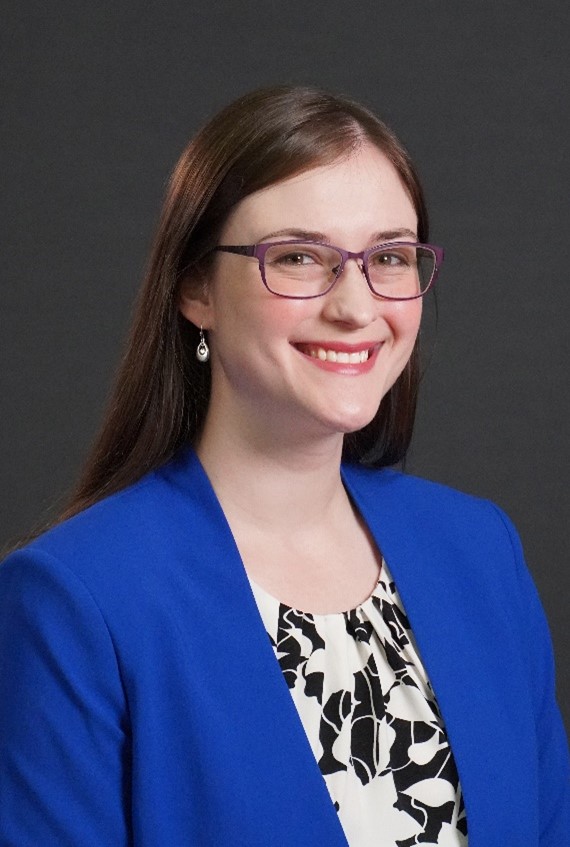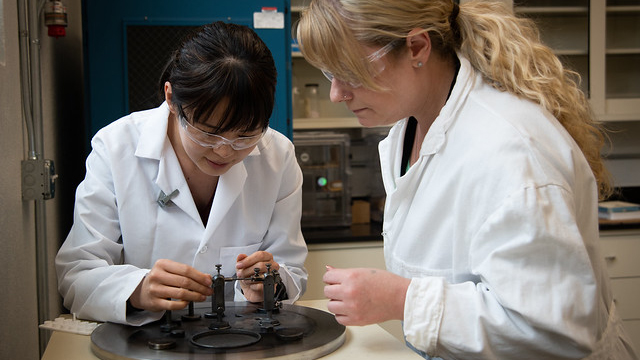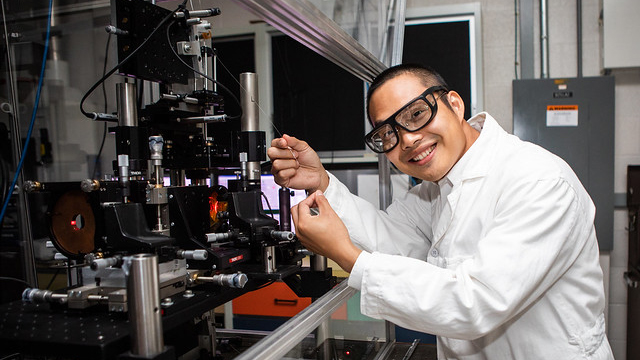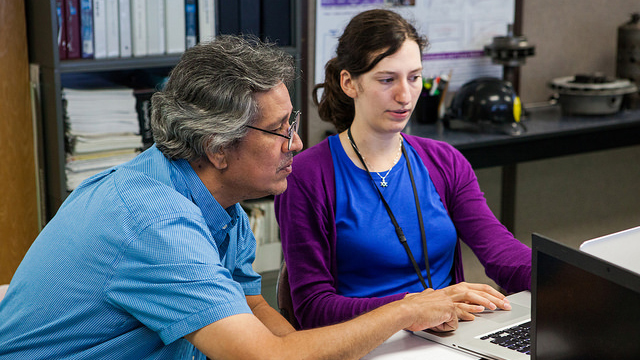Office of Science Graduate Student Research Program (SCGSR)
The SCGSR program provides supplemental awards to outstanding U.S. graduate students to pursue part of their graduate thesis research at a DOE laboratory/facility. The research opportunity is expected to advance the graduate students’ overall doctoral thesis while providing access to the expertise, resources, world-class facilities and capabilities available at the DOE laboratories/facilities. NETL is pleased to be one of the hosting DOE national laboratories/facilities who participate in this exciting program. Graduate students in the program will collaborate with an NETL laboratory scientist for a period of 3–12 consecutive months.
Meet Some of Our Participants:

Name: Samantha Fuchs
Hometown: Naperville, IL
Education:
- University of Illinois at Urbana-Champaign – Bachelor of Science in Chemistry
- University of Texas at Austin – MS/PhD in Environmental Engineering
Current Title/Role: Senior Staff Professional at Geosyntec Consultants
Research Project(s) while at NETL:
Geochemical and geomechanical alteration along artificially fractured reservoir rock and caprock under geological carbon sequestration conditions: In geological carbon sequestration, captured CO2 emissions are injected into the subsurface for permanent to mitigate the effects of CO2 in the atmosphere. The injection of CO2 reduces the pH of the formation fluid which can cause dissolution and precipitation reactions. In fractures, preferential flow can cause dissolution of reactive minerals and weaken the rock. My research focused on two projects of flow through artificially fractured (1) sandstone reservoir rock and (2) shale caprock, in a shearing core holder under reservoir pressure. In the sandstone study, I found significant dissolution of the dolomite cements, weakening of the material’s fracture toughness, and shear slip occurring at a faster rate under acidic conditions compared to a neutral control. In the shale study, I found dissolution of the calcite present in the shale matrix and weakening of the shale surface corresponding to areas of greatest flow. These studies both contributed to the collective knowledge and future modeling efforts for geological carbon sequestration projects.
What is the most impactful or valuable thing that you learned from your experience at NETL?
The most impactful thing I learned from my experience was the division of tasks on a research team. In academia, I was used to only speaking with my mentor and working alone in the laboratory. At NETL, I had my mentor and spoke to many different folks with a variety of expertise and different previous real-world experience to help refine my experimental designs over time. I got training from different technicians on different equipment (rock saws and milling machines, XRD, SEM-EDS) and learned how to collaborate with technicians who were dedicated to their specific instruments (CT scanner, XRF). It really helped me understand workplace communication and collaboration in a project-based environment.
My project was only possible because of the shearing flow cell housed within the industrial CT scanner room at NETL. I had done small batch studies at my university with 3D imaging before and after reaction, but there was no capability for in-situ CT scanning, let alone flow studies. My advisor’s earlier collaboration with my NETL mentor provided the connection for me to reach out and ask about the capabilities of their flow cell and the design of my research project. NETL equipment and facilities are truly one-of-a-kind.
How do you think your experience at NETL will help you make an impact in the energy sector?
My experience at NETL gave me insight into the technical reports in the geologic world that go into well exploration and understanding sites. This gave me a lot of context for getting a job in an environmental/energy consulting firm and I am now able to support companies seeking to develop commercial scale geologic carbon sequestration projects that I had studied in the lab.
The specific subject matter of my studies has given me a great background of understanding the energy sector, particularly in carbon emission mitigation, due to the background literature research I did for my laboratory studies but also through communicating with experienced scientists, engineers, and technicians at NETL. My specific knowledge on geological carbon sequestration has allowed me to join my company’s team helping client companies in the energy sector develop geologic carbon sequestration projects, with site characterization, monitoring plans, and writing permit applications. I had an amazing experience at NETL and would highly recommend it for future students.
Name: Jeff Hudson
Hometown: Marysville, MI
Education:
- Michigan State University - B.S. Environmental Geoscience
- Western Michigan University - M.S. Geoscience
- University of Delaware - Ph.D. Civil Engineering
Current Title/Role: Postdoctoral Research Associate at Oregon Health & Science University
Research Project(s) while at NETL:
Shale organic matter-catalyzed oxidation of FeII in hydraulic fracturing fluid:
With the NETL, my focus was to investigate how shale organic matter in hydraulic fracturing fluid (HFF) mediates iron oxidation in fracking well operations. Oxidation of iron can cause mineral scaling in fissures within fracking wells, leading to a decrease in production. What I was specifically interested in was how iron complexation with organic ligands in the shale organic matter can accelerate/enhance oxidation of Fe(II). I investigated this process electrochemically by measuring current responses from shale oxidation in the presence of some model compounds that are representative of ligands in shale organic matter.
What is the most impactful or valuable thing that you learned from your experience at NETL?
As cliché or out-of-the-box as it sounds, the most valuable thing I learned at the NETL was time management and how to balance multiple projects at the same time. I had a lot of simultaneous projects running around the same time as I was finishing my Ph.D.; it was tough but doable!
Currently, I am a postdoctoral research associate at Oregon Health & Science University (OHSU). Despite logistical issues involving covid during my SCGSR experience, the program helped me in many ways transition into my current role as a postdoctoral research associate. Time management and communication were skills that I learned that are very beneficial in my current position, where I balance multiple projects and collaborate with people across the country and around the world. Additionally, the research I performed helped me gain some more ideas for my own future research projects, which may be beneficial when writing future research grants as I start to apply for tenure-track positions.
What ignited your early interest in science? I’ve always been interested in science. As a young kid, I was always an “observer”, and my initial interests revolved around meteorology, but quickly shifted towards environmental science due to my love of the outdoors. My aqueous geochemistry professor during my undergraduate studies (Dr. David Long, Michigan State) really solidified my fascination in geochemistry. The way he lectured and discussed environmental chemistry really excited me and helped me realize that environmental chemistry was going to be the way I made a large impact in the world.
Name: Manh Tien Nguyen
Hometown: Originally from Vietnam then to Lexington, Kentucky
Education:
- Hochiminh City University of Technology - B.Eng. in Chemical Engineering
- University of Kentucky - Ph.D. in Chemical Engineering
Current Title/Role: PhD candidate and 2022 SCGSR Participant
Research Project(s) while at NETL:
Deep Learning Potential-based Molecular Dynamics Simulation Investigation of Chemical Conversion-Absorption Coupling of CO2 at Air-Reactive Deep Eutectic Solvent Interface:
Capturing CO2 from the air is urgent to battle climate change. Traditional CO2 capture by aqueous amine has high energy consumption due to regeneration cost, equipment corrosion, and amine leakage to the environment. Deep eutectic solvents (DESs) are promising alternative sorbents due to their low vapor pressure, low corrosion, non-toxicity, relatively low cost, and biodegradable nature. Furthermore, functionalized DESs can absorb and react with CO2 at low partial pressures with high capacity, low viscosity, and energy consumption. Developing reactive DESs for efficient CO2 chemical absorption needs a foundational understanding of the mechanisms governing the reaction-transport coupling of CO2 at the air-DES interface. The interface plays a critical role in CO2 chemisorption since the interface is the first place for gaseous CO2 to contact with DES components. Understanding the CO2 reaction-transport mechanisms at the interface can facilitate the development of novel DAC technology using reactive DESs with high capacity and stability. Deep Potential-based Molecular Dynamics (DPMD) is an important computational simulation method for studying complex chemical and physical mechanisms. The goal of this project is to develop a DPMD model that can be used to investigate the adsorption and chemical conversion of CO2 at an air-DES interface.
What is the most impactful or valuable thing that you have learned from your experience so far at NETL?
The most impactful thing I learned at NETL is that research collaboration is emphasized and there are lots of opportunities to collaborate with world-class scientists on different types of research.
The SCGSR program provides me the opportunity to contribute to the development of novel direct air capture technology using reactive DESs, fitting NETL’s Carbon Capture Program for the advancement of negative emissions technologies. The research helps me enhance my knowledge and skills in CO2 capture reaction modeling and machine learning-molecular simulation integration. Additionally, I had the opportunity to collaborate with world-class scientists and learn from their expertise in the field.
How do you think your experience at NETL will help you make an impact in the energy sector?
My deep understanding of the CO2 capture technology and the chemical reactions involved will be valuable in identifying and evaluating potential CO2 capture solutions for the energy industry. Conducting research with world-class scientists provides me with insights into the latest research and developments in the field, which will be valuable in identifying and evaluating new and emerging technologies. The collaboration and teamwork skills that I developed at NETL are essential in the energy sector where projects are often multidisciplinary.









